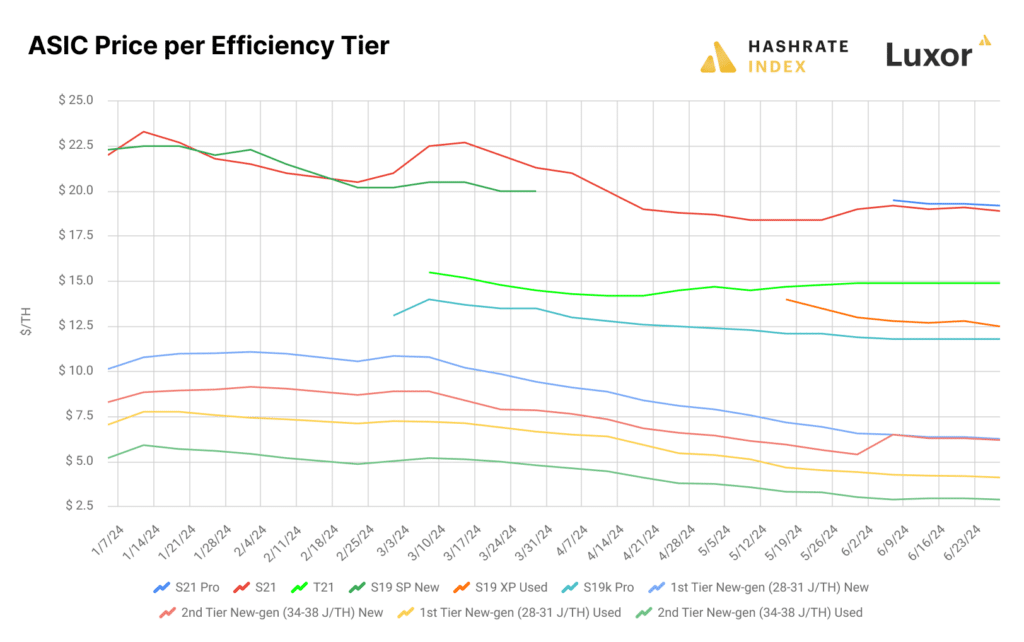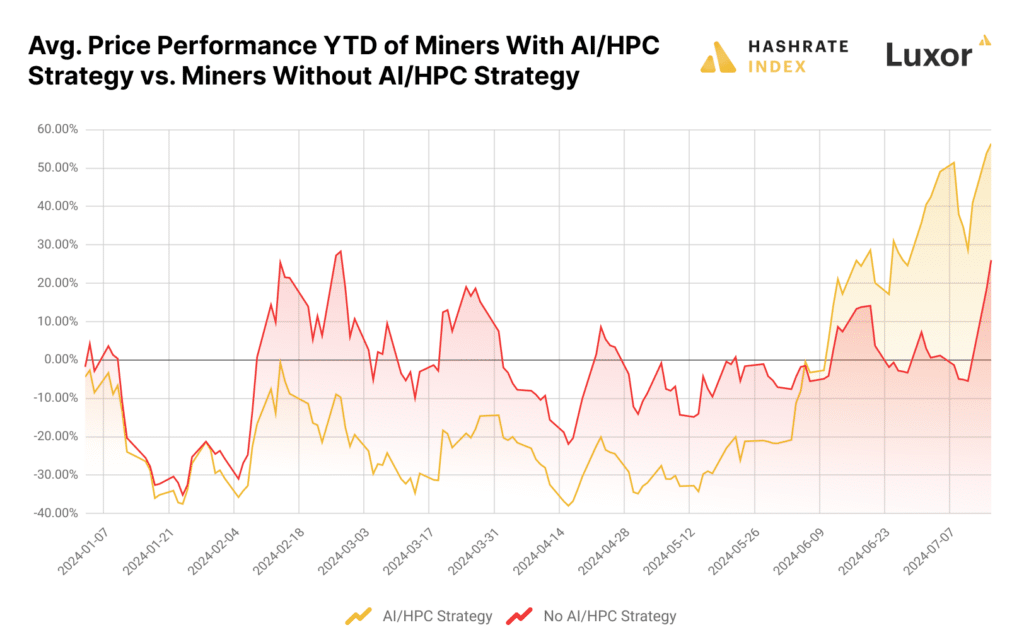Following Bitcoin’s April halving, which cut miners’ rewards, many mining models saw “significant drawdowns” in pricing, according to Hashrate Index.
The ASIC market is undergoing significant changes as mining rigs are trying to adapt to a post-halving environment, with Bitcoin’s (BTC) hashprice hitting record lows. The latest generation of Bitcoin miners, such as the S21 and T21, performed significantly better than older models in Q2, analysts at Hashrate Index say, adding that crypto miners prioritized efficiency to navigate the current challenging market environment.

ASIC prices | Source: Hashrate Index
Despite its industry-leading efficiency at launch, the S21 saw a price drop leading up to the halving, indicating it was initially “overpriced,” the analysts say, However, it rebounded during the remainder of the quarter and ended Q2 with only a marginal decline.
You might also like: Bitcoin’s hashrate plunge mirrors 2021 China ban, Hashrate Index says
Hashrate Index points out that Q2 reversed what had been a promising year for Bitcoin’s hashprice. Following a strong Q1, hashprice experienced a significant downturn, hitting an all-time low of $44.43 PH/day in May. Over Q2, Bitcoin’s USD hashprice plummeted 56% to $49.16/PH/day, marking a 53% year-to-date decrease and a 38% year-over-year decline, the analysts say, adding that on a BTC-denominated basis, hashprice fell 68% on a year-to-date basis.

Crypto miner’s performance with AI/HPC vs those without AI/HPC | Source: Hashrate Index
The analysts also commented on the revenue diversification efforts by several public miners. Despite moves to offer artificial intelligence and high-performance computing services, Q1 data indicates that self-mining remains the dominant revenue stream for public miners. Discussions around the potential of AI and HPC strategies reveal that these businesses currently “make up a fraction of a fraction of overall revenue,” according to the analysts.
Read more: Bitcoin’s hashrate reached post-halving bottom, analysts say





















































































how can i get clomiphene get clomiphene online order generic clomid without rx order clomid online cost of generic clomiphene without a prescription where can i buy cheap clomid no prescription how can i get clomiphene tablets
Thanks towards putting this up. It’s well done.
This is the amicable of content I enjoy reading.
order zithromax generic – buy sumycin generic order metronidazole 400mg pills
semaglutide 14 mg sale – buy semaglutide pills for sale periactin online buy
domperidone online order – sumycin 500mg us cyclobenzaprine 15mg cheap
buy clavulanate generic – https://atbioinfo.com/ buy ampicillin pills
buy generic nexium online – nexium to us buy esomeprazole medication
medex us – https://coumamide.com/ buy losartan 25mg without prescription
meloxicam uk – swelling order meloxicam 15mg online cheap
deltasone 20mg over the counter – https://apreplson.com/ buy deltasone 40mg sale
erection pills viagra online – how to buy ed pills otc ed pills
where to buy amoxil without a prescription – combamoxi buy amoxicillin tablets
order fluconazole 100mg sale – https://gpdifluca.com/# order fluconazole online
order lexapro pills – https://escitapro.com/ buy escitalopram 10mg online cheap
buy cheap generic cenforce – on this site cenforce 50mg us
cialis instructions – https://ciltadgn.com/ tadalafil 5mg generic from us
combitic global caplet pvt ltd tadalafil – tadalafil with latairis tadalafil (exilar-sava healthcare) version of cialis] (rx) lowest price
how to get ranitidine without a prescription – https://aranitidine.com/ zantac 150mg generic
best mail order viagra – https://strongvpls.com/# want buy cheap viagra
The thoroughness in this draft is noteworthy. este sitio
Thanks an eye to sharing. It’s first quality. https://buyfastonl.com/furosemide.html
I’ll certainly carry back to skim more. https://ursxdol.com/propecia-tablets-online/
This is the type of enter I recoup helpful. https://prohnrg.com/product/rosuvastatin-for-sale/
The thoroughness in this break down is noteworthy. https://aranitidine.com/fr/lasix_en_ligne_achat/
I’ll certainly bring to be familiar with more. https://ondactone.com/simvastatin/
More posts like this would force the blogosphere more useful.
order sumatriptan 50mg generic
The thoroughness in this break down is noteworthy. http://www.01.com.hk/member.php?Action=viewprofile&username=Olpudl
where to buy forxiga without a prescription – buy forxiga 10mg online dapagliflozin 10mg without prescription